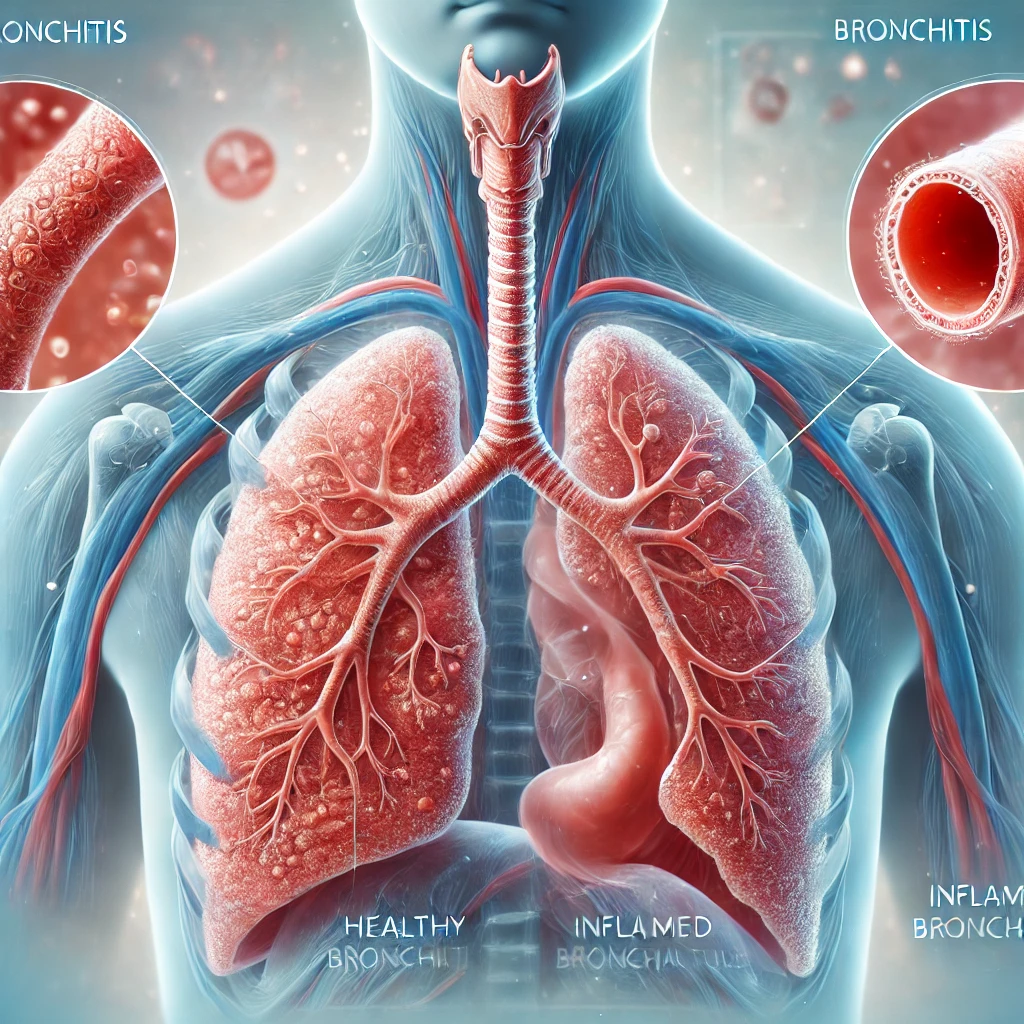Bronchitis is a common respiratory condition that affects millions of people each year. It occurs when the bronchial tubes, which carry air to and from the lungs, become inflamed. This inflammation can cause persistent coughing, mucus production, and breathing difficulties. While acute bronchitis often resolves on its own, chronic bronchitis requires long-term medical attention.
In this article, we’ll discuss the causes of bronchitis, its symptoms, treatment options, home remedies, and when to seek professional medical care.
Causes of Bronchitis
Bronchitis occurs when the airways in the lungs become irritated and inflamed. The most common causes include:
- Viral Infections: Most cases of acute bronchitis result from viruses, such as influenza or the common cold.
- Bacterial Infections: Although less common, bacterial infections can also lead to bronchitis.
- Smoking: Tobacco smoke is a significant contributor to chronic bronchitis, as it damages the lining of the bronchial tubes.
- Air Pollution and Irritants: Exposure to pollutants, dust, chemical fumes, and strong odors can trigger bronchitis.
- Weak Immune System: People with weakened immune systems, such as infants, older adults, and those with chronic illnesses, are more susceptible to bronchitis.
Symptoms of Bronchitis
Symptoms of bronchitis vary depending on whether the condition is acute or chronic. The most common symptoms include:
- Persistent cough that produces mucus (clear, yellow, green, or sometimes blood-streaked)
- Shortness of breath or difficulty breathing
- Chest discomfort or tightness
- Wheezing or whistling sound while breathing
- Fatigue and body aches
- Mild fever and chills
- Sore throat or nasal congestion
Acute bronchitis symptoms typically last between 7 to 21 days, while chronic bronchitis can persist for months or even years, often worsening over time.
Treatment Options for Bronchitis
The treatment for bronchitis depends on the severity of symptoms and the underlying cause. In many cases, mild bronchitis can be managed at home, while more severe cases require medical treatment.
Medications for Bronchitis
Doctors may prescribe medications to help alleviate bronchitis symptoms and reduce inflammation in the airways. One common treatment option includes taking prednisone for 5 days bronchitis, which helps reduce inflammation and improves breathing.
Other medications that may be prescribed include:
- Bronchodilators: These medications help relax the muscles around the airways, making breathing easier.
- Cough Suppressants: Used when a cough is persistent and interferes with sleep.
- Antibiotics: These are only necessary if a bacterial infection is causing bronchitis.
For chronic bronchitis, additional treatments such as oxygen therapy and pulmonary rehabilitation may be recommended.
Home Remedies for Bronchitis
In addition to medical treatment, several home remedies can help ease bronchitis symptoms and promote recovery.
- Stay Hydrated: Drinking plenty of fluids helps thin mucus, making it easier to expel.
- Get Plenty of Rest: Adequate sleep supports the immune system in fighting infections.
- Use a Humidifier: Adding moisture to the air can soothe inflamed airways and reduce coughing.
- Avoid Smoking and Irritants: Exposure to smoke, dust, and pollutants can worsen symptoms.
- Drink Warm Fluids: Herbal teas, honey, and broths can help soothe the throat and reduce coughing.
- Saltwater Gargle: Gargling with warm salt water can relieve throat irritation and break up mucus.
These natural remedies can help speed up the healing process and make symptoms more manageable.
When to See a Doctor
While many cases of bronchitis resolve on their own, it is essential to seek medical attention if you experience:
- Symptoms lasting longer than three weeks
- High fever (above 102°F)
- Difficulty breathing or severe shortness of breath
- Blood in mucus
- Persistent chest pain or tightness
If symptoms worsen, a doctor may prescribe taking prednisone for 5 days bronchitis to reduce inflammation and improve lung function.
Preventing Bronchitis
Although bronchitis is common, there are several steps you can take to reduce your risk of developing it.
- Wash Your Hands Regularly: Prevents the spread of viruses and bacteria.
- Get Vaccinated: The flu shot and pneumonia vaccine can help protect against infections that may lead to bronchitis.
- Quit Smoking: Avoiding tobacco smoke significantly lowers the risk of chronic bronchitis.
- Wear a Mask in Polluted Areas: Protects the lungs from dust, fumes, and chemicals.
- Maintain a Healthy Lifestyle: Eating nutritious foods and staying active strengthens the immune system.
By taking these precautions, you can lower your chances of developing both acute and chronic bronchitis.
Final Thoughts
Bronchitis can be a frustrating condition, but with proper care and treatment, most people recover without complications. Whether through home remedies, medications, or prescribed treatments like prednisone, managing symptoms effectively is crucial for recovery.
If you or a loved one is experiencing bronchitis symptoms and needs medical attention, contact Interstate Pulmonary Associates to schedule an appointment with a specialist.
